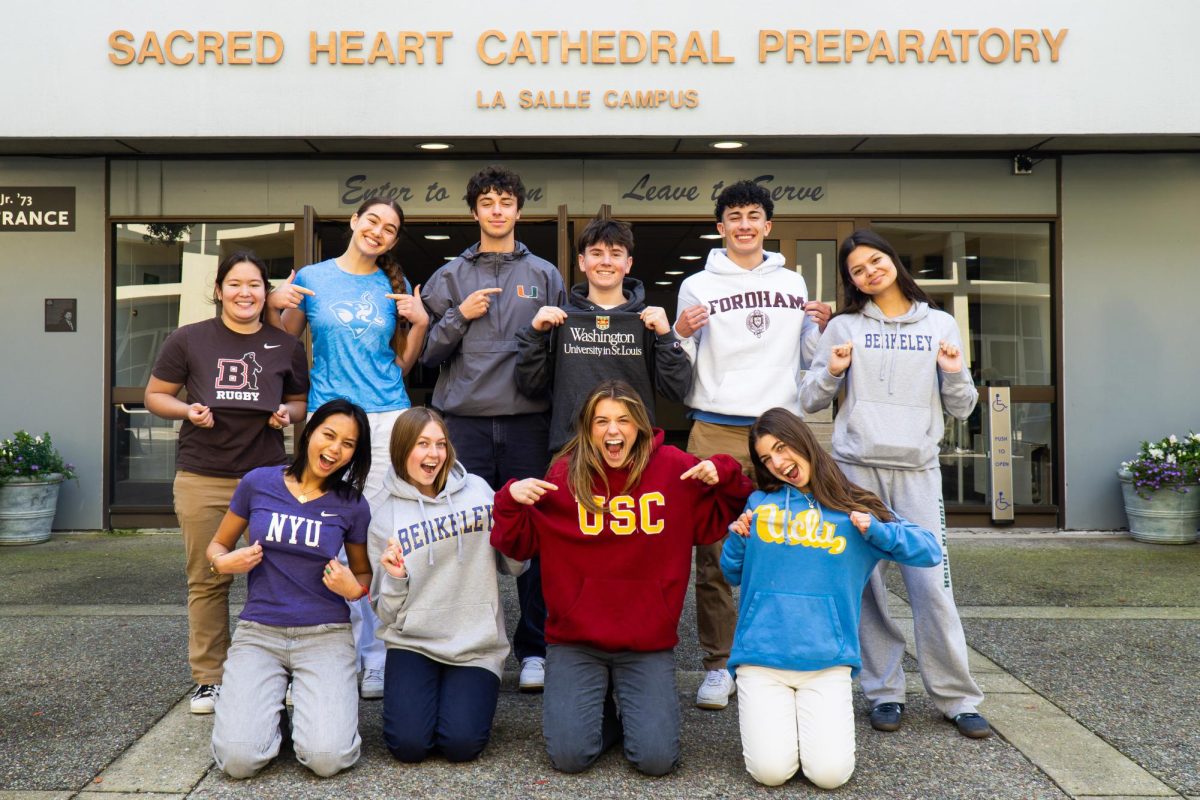High school comes with a whole new set of changes: new friends, a packed schedule, and opportunities around every corner. Even transitioning from the first to the second year can come with its own array of unexpected changes. These new experiences can seem daunting at first, especially when paired with the faster pace of high school classes.
Have a question you need answered? Nervous about your future AP tests? Making sure not to miss out on anything? No problem! Just ask us! The Emerald enlisted upperclassmen to give advice along with their honest and helpful answers for all your burning questions.
*quotes edited for clarity*
If you could repeat your freshman year, what is one thing you would do differently? What is one club, activity, or class that you would have taken? – Parker Mead ‘28
“One thing I would do differently is to try to make more friends and get more involved and definitely be more open to making new friendships. One class I would have taken is one of the choirs.” Alejandra Taylor ‘25
“Look for something you are passionate about and pursue it. Don’t just do things that make you look accomplished because everyone can see through that.” Ben Wiggins ‘25
“I would have joined student council freshman year and joined more clubs that I would want to be a leader in.” Julia Frazier ‘25

In sophomore year, does the workload progress throughout the year, or does it stay as hard as it is from the get-go? – Berlyn Ring ‘27
“The workload fluctuates, especially with whatever classes you are taking. Honors and AP classes keep up the rigor for the majority of the year, but you will adjust to the workload.” Echo McDonald ‘26
“Personally, the first quarter is always the hardest to me because it introduces a bunch of new concepts, but after you get used to the material, the teacher and the class, it’s much easier.” Cyrus Ma ‘26
How does one deal with the transition of a heavier workload? – Juliette de Clapiers ‘27
“Time management and communication with your teachers are essential. Make sure to give yourself breaks while doing homework and studying.” Echo McDonald ‘26
“Make sure to not get overwhelmed. That’s the crucial part. Start slowly and work in small chunks. Don’t be afraid to be honest with your teacher about the workload and your possible problem of adjusting. But try to get adjusted as soon as possible.” Alejandra Taylor ‘25
“Find your way to study and manage time as early as possible. Try your best to create these fundamental routines so that you can tackle work in a structured way as it gets heavier.” Ruby Hernandez ‘25
What is your best advice for taking the AP tests? – Simone Cohen ‘27
“Make sure to prepare your best, pay attention to your AP class(es) all year and do the work assigned…For the day of [the test], go prepared with your materials and be mentally ready to be testing for the next two or three hours.” Alejandra Taylor ‘25
“Don’t stress too much. If you have extended time, take it! Check in with teachers when needed.” Sam Meraw ‘25
“Do the practice tests on CollegeBoard, and review the stuff you didn’t fully learn the first time around.” Haley Fiske ‘26
Is it wise to start preparing for college applications in sophomore year? – Berlyn Ring ‘27
“Avoid the mindset that everything you do is to boost your college application. Place your priority in establishing your own interests, finding communities that you align with, and ways to enhance the best version of yourself, and you’ll develop areas of your college application without even realizing it. As the years go by and you compile information about schools, areas, and communities that pique your interest, take note of it. Think of the college application as something that lives up to your standards, not the opposite.” Ruby Hernandez ‘25
“Thinking ahead of time about what colleges you would like to go to or what you want to write for your personal statement is a good idea if you have the extra time for it. It’s definitely not a necessity at all in sophomore year, though. Think about these things if you have a plan down, but don’t worry if you aren’t sure yet – it’s totally okay at that stage of the game.” Nico Will ‘25
“I would say it’s a good idea to at least start building up your resume/list of activities such as starting/becoming a club moderator, doing a sport or dance team, joining student council, being part of theater/tech crew or other extracurriculars to show that you are involved in the school and participate in a variety of things.” Cyrus Ma ‘26
What is it like adjusting to the upperclassmen schedule and workload? – Maggie Crehan ‘27
“It wasn’t that hard to transition to the upperclassmen schedule since you might get a taste of it in sophomore year if you have an advanced or AP class. The workload always depends on the number of APs you’re taking and the AP class. It should be a bit more of a workload, but it shouldn’t be a horrible increase in workload.” Alejandra Taylor ‘25
“I think the days will feel quicker since with the upper schedule, you only have one more class after lunch break, instead of two. You might feel like you have less energy in the morning, but that can be solved by eating breakfast or better yet, a good night’s sleep.” Nico Will ‘25
How hard is it managing school and the college application process? – Alexandra Aguila ‘27
“What is important for managing is starting the college application process early. By early, I mean late junior year and you put a very good amount of effort into the college work during the summer before your senior year. Like that, a lot of weight will be lifted from your shoulders. During the school year, it is hard to manage, especially with homework, but it is even harder if you haven’t started at all and have not taken advantage of the summer before senior year.” Alejandra Taylor ‘25
“It is difficult, but it is worth it to devote time to it.” Ben Wiggins ‘25
What is the AP test like, is it very difficult? – Siena Larkin ‘27
“If your teacher continuously acclimates you to the test, and you are studying in your own time the College Board material, it is not bad at all. The only tricky part of it is that it is a standardized test, so you have to pretty much learn the “language” of the College Board, which is a skill you will develop in and of itself.” Ben Wiggins ‘25
“Usually your teachers will over prepare you so the tests end up being a bit easier.” Julia Frazier ‘25
What’s the most stressful and challenging part about applying to colleges? – Siena Larkin ‘27
“For me, it’s deciding where to go and making sure to check all of the possible information and factors that could influence your decision to apply to that college. Another very challenging part is crafting your common app essay and your UC PIQ answers if you’re planning to apply to any of those.” Alejandra Taylor ‘25
“Figuring out where you want to go.” Sam Meraw ‘25

What tips do you have for managing a packed schedule? – Sophia Montgomery ‘27
“Get your homework done as soon as possible and don’t be afraid to say no to time consuming opportunities.” Julian Coleman ‘26
“Come to school early (if you can and don’t have a morning class) and ask your teachers, or other teachers in the same field, about any questions you have. I recommend starting your homework on the day it is assigned, but if you can’t do that, I suggest at least looking over the homework and material to check if there’s anything you’re confused about or need to review.” Cyrus Ma ‘26
“Do your homework in small chunks and don’t do everything straight with no breaks in between, otherwise you will burn out for sure. Don’t get overwhelmed and do at least one thing per day that you personally enjoy doing that is not school work. If you have too many extracurriculars, don’t be afraid to drop one or two of them if it will lead to your overall success.” Alejandra Taylor ‘25
How did you/how are you preparing for college applications? – Isabella Devlin ‘27
“I’m putting in my personal information in the common application and UC application ahead of time to save time later, writing/drafting/revising answers to the common app essay and the UC PIQs, and researching everything to know about possible colleges that I might be interested in. I’m putting in this work when I’m tired of doing homework and doing a good chunk of it every weekend.” Alejandra Taylor ‘25
“I’m allocating at least 30 minutes of time every day to chip at them slowly but surely. I brainstormed and drafted possible personal statements over the summer to make the transition into the school year easier. I’ve limited my time on social media because I have a bad phone addiction, so that definitely structures my mindset toward how to better my application.” Ruby Hernandez ‘25
“1) Meeting with college advisor 2) Watching Youtube videos on applying 3) Writing college essays 4) Researching colleges.” Sam Meraw ‘25
Hopefully this advice will help you feel much more ready and excited for your start to the school year! Thank you to all our upperclassmen for taking the time to pass on their scholarly knowledge and wisdom!
* The Emerald will continue with this series throughout the year, so if you are a lowerclassmen, make sure to fill out this form with any upperclassmen questions you have *









